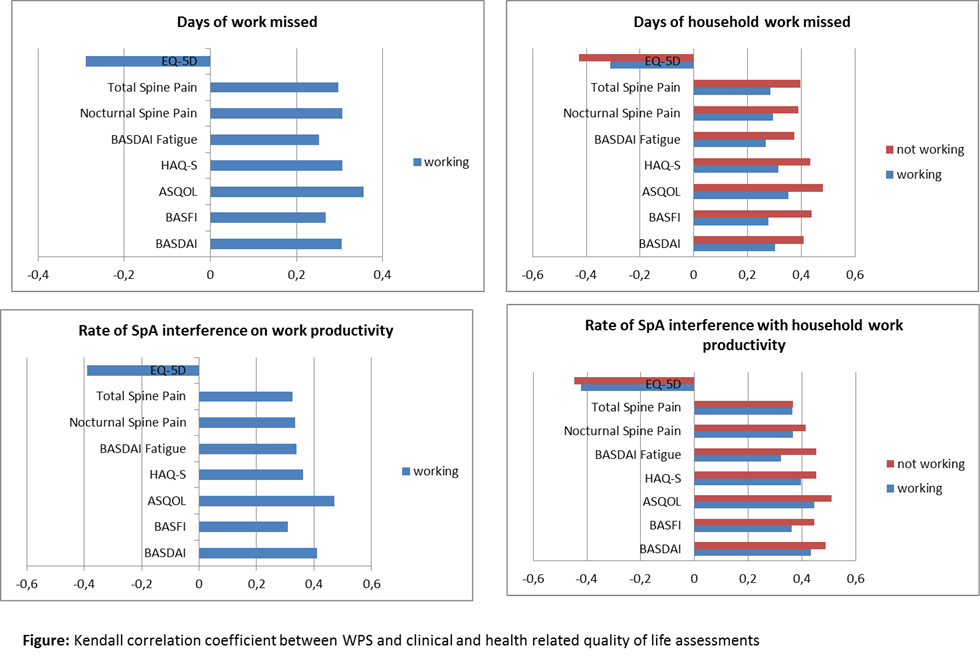Session Information
Date: Sunday, November 8, 2015
Session Type: ACR Poster Session A
Session Time: 9:00AM-11:00AM
Background/Purpose: Ankylosing Spondylitis (AS) is associated with a high disease burden. The greatest contributor to the burden is loss of productivity. The data on productivity loss in Turkish patients with AS is scarce. Work Productivity Survey (WPS) is a validated tool in AS to assess productivity during the preceding month, both at work and at home. The aim of this study is to assess work productivity in Turkish AS patients using the WPS.
Methods: A total of 397 patients with AS (males:71.4%, mean age: 40.5, mean disease duration 6.8 years) from 19 rheumatology centers across Turkey were included in the study. Patients, with the help of a health professional, completed questionnaires for BASDAI, BASFI, HAQ-S, ASQoL and EQ-5D, total and nocturnal pain and WPS. Student’s t test was used to compare continuous variables and chi square analysis was used to compare categorical variables. The association between the responses to WPS questions and scores of disease activity, functional and quality of life scores was assessed using Kendall correlation coefficients.
Results: Of all the patients, 62.4% of were employed, 16.1% were homemakers, 9.6% were retired, 3.0% were student and 5.3% were unable to work due to AS. Non-working patients, as compared to the working patients, were older (44 vs 38, p: <0.001), more likely to be female (54% vs 14%, p: <0.001) and had less favorable scores for BASDAI (3.8 vs 3.0, p: <0.015), BASFI (2.9 vs 2.3, p: 0.001), HAQ (0.8 vs 0.5, p: <0.001), EQ-5D (0.6 vs 0.7, p: 0.005) and productivity. Working AS patients reported missing 1.2 days of work and had 2.8 days productivity reduced by at least half. As compared to the working patients, the non-working patients missed more days of housework (5.4 vs 2.9), more days of family, social or leisure activities, more and had more days with outside help, more days with reduced productivity in house work in the past month (for all comparisons, p: <0.001). However, no difference was observed between the working and not working female patients. WPS questions were shown to have moderate correlation with other clinical and health related quality scores either at workplace or at home (range from r: 0.268 to r: 0.481) (Figure).
Conclusion: AS has a considerable impact on productivity for working and non-working patients, particularly in females. WPS is a useful tool to appreciate the burden of disease in patients with AS not only at workplace, but at also at home, which may be even more important in populations with a low women’s workforce participation rates.
To cite this abstract in AMA style:
Solmaz D, Cetin P, Pamuk ON, Cefle A, Keser G, Ozturk MA, Sayarlioglu M, Turgay M, İnanc N, Sari RA, Akar S, Sener S, Koca SS, Kobak S, Senturk T, Kalyoncu U, Cobankara V, Karaaslan Y, Pehlivan Y, Akkoc N. The Impact of Ankylosing Spondylitis in Turkey on Productivity at Work Outside Home and within the Household [abstract]. Arthritis Rheumatol. 2015; 67 (suppl 10). https://acrabstracts.org/abstract/the-impact-of-ankylosing-spondylitis-in-turkey-on-productivity-at-work-outside-home-and-within-the-household/. Accessed .« Back to 2015 ACR/ARHP Annual Meeting
ACR Meeting Abstracts - https://acrabstracts.org/abstract/the-impact-of-ankylosing-spondylitis-in-turkey-on-productivity-at-work-outside-home-and-within-the-household/

